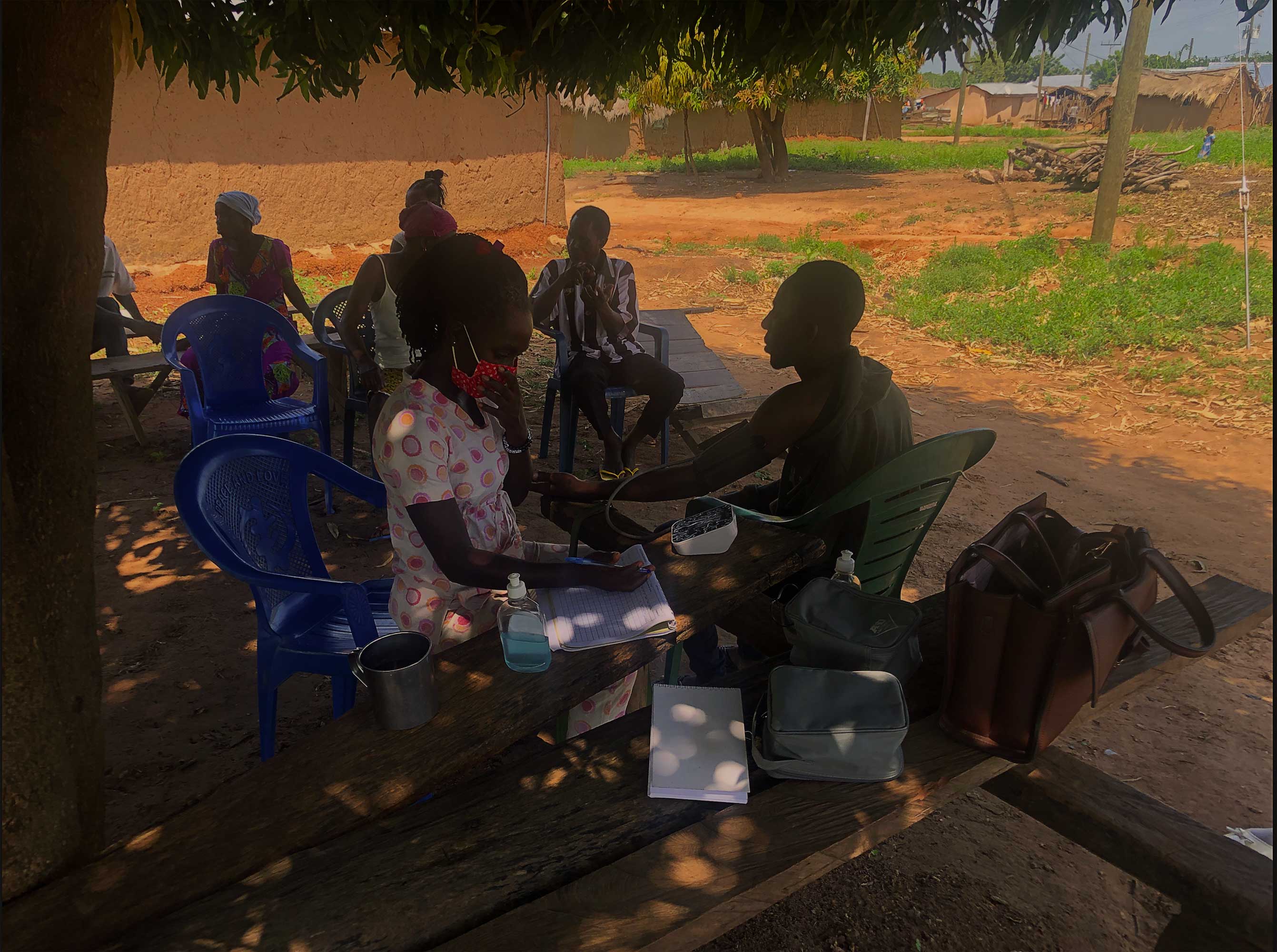UPTAKE OF TASK-SHIFTING STRATEGY FOR BLOOD PRESSURE CONTROL
January 9, 2019 | News release | Reading time: 2 min
A workshop on the Uptake of Task-Shifting Strategy for Blood Pressure Control in Community Health Planning Services( TASSH study) was held at the KHRC to train Community Health Officers(CHOs) to be able to identify, initiate counselling and refer patients for specialist care.
Study Team: Dr. Kwaku Poku Asante, Prof. Jacob Plange-Rhule, Prof. Gbenga Ogedegbe, Prof. Juliet Iwelunmor, Joyce Gyamfi, William Chaplin, Kezia Mantey, Kingsley Apusiga, Solomon Nyame, Kwame Adjei, Oscar Agyei, Felix Oppong
In 2017, National Institute of Health through the National Heart Lung Blood Institute approved a study in Ghana to build the capacity of community health workers to identify hypertensives, counsel and refer cases to the next level of care.
The goal of this current study is to evaluate, in a hybrid clinical effectiveness-implementation design, the effect of practice facilitation (PF) on the uptake of an evidence-based Task-Strengthening Strategy for Hypertension Control
(TASSH), among 700 adults with uncontrolled hypertension (HTN) identified within communities under 70 Community-Based Health Planning Services (CHPS) zones. Attempts to improve access to health services for individuals identified at
the community level: Uptake TASSH Programme interventions The practice facilitation intervention has three components:
1. Formation of a steering committee to help identify barriers and enablers to implementing Uptake TASSH at
the CHPS zones (national, regional and district committees); and to help with the implementation of the program at the CHPS zones (local regional committee).
a. The membership of the national level the steering committee
are: Bono Regional Director of Health Services, Bono East Regional Director of Health Services, Director Policy Planning Monitoring and Evaluation of Ghana Health Service, Deputy Director Policy Planning Monitoring and Evaluation of
Ghana Health Service, Director, Research and Development Unit Ghana Health Service, Director Clinical Care Ghana Health Service, Senior Manager at National Health Insurance Authority, Nationals CHPS Coordinator, Ghana Health Service,
Representative, Community Health Nurses and the NCD Programme Manager, Ghana Health Service
2. Development of the Task Strengthening Facilitation (TSF) strategy. The TSF strategy includes training of task strengthening facilitators
(TSFs) on coaching strategies (Engaging, Enhancing, and Evaluation) to help CHOs perform their tasks; training the CHOs on Identifying, Counseling and Referring (ICR) of adults with HTN to the health centres using the 5 As counselling
strategy (ask, assess, advise, assist and arrange); and creation of a community learning environment that will support learning opportunities for the CHOs and TSFs.
3. Engagement of the community to create a community urgency
and persistency of the importance of HTN screening and referral for adults.
Objectives:
1.Identify practice capacity for the adoption of TASSH at CHPS compounds and develop a culturally tailored Practice Facilitation (PF) strategy using qualitative methods.
2.Evaluate in a stepped-wedge cluster
randomized control trial, the uptake of a Practice Facilitation (PF) strategy versus the Usual Care (UC) in the control and management of blood pressure in Community Health Planning Services
3.Compare in a stepped-wedge cluster
RCT, the clinical effectiveness of the PF strategy vs. UC on systolic BP reduction among adults with uncontrolled hypertension..
This study seeks to build the capacity of Community Health Workers to screen community members
with hypertension, counsel those with high levels of blood pressure and refer them to the next level for care. Also, the study seeks to improve the blood pressure of individuals identified with high blood pressure.
Brief methodology:
This mixed-methods, “Hybrid Type II” Effectiveness-Implementation study will take place in six contiguous districts in the Brong Ahafo of Ghana (Kintampo North, Kintampo South, Nkoranza North, Nkoranza South,
Techiman Municipal, and Techiman North). A culturally acceptable practice facilitation strategy will be developed based on recommendations from key stakeholders guided by Damshroeder’s Consolidated Framework for Implementation Research
(CFIR). Community Health Officers will be trained based on the practice facilitation strategy developed. Seventy (70) CHPS zones will be selected and randomized into intervention and control groups. The intervention group will implement
the practice facilitation strategy whereas the control group will provide the usual care in the first year. In the second year, the usual care group will implement the facilitation strategy whereas the implementation group will provide
the usual care. At the post-implementation phase, the study team will evaluate the adoption and sustainability of TASSH in participating CHPS zones using the Reach Effectiveness Adoption Implementation and Maintenance (RE-AIM) framework.
Expected outcome:
Primary Outcome: The rate of adoption of TASSH at the CHPS compounds. The primary outcome will be assessed by the following measures:
Secondary Outcomes:
1.The between-group difference in systolic BP
2.Mediators of adoption of TASSH at the CHPS compounds
3.The sustainability of TASSH uptake.

Khrc Employee taking blood Pressure
Study duration:
60 months
Project start date:
September 2017
Project end date:
December
Funders:
National Institute of Health (NIH)
Collaborators:
New York University, Kwame Nkrumah University of Science and Technology
